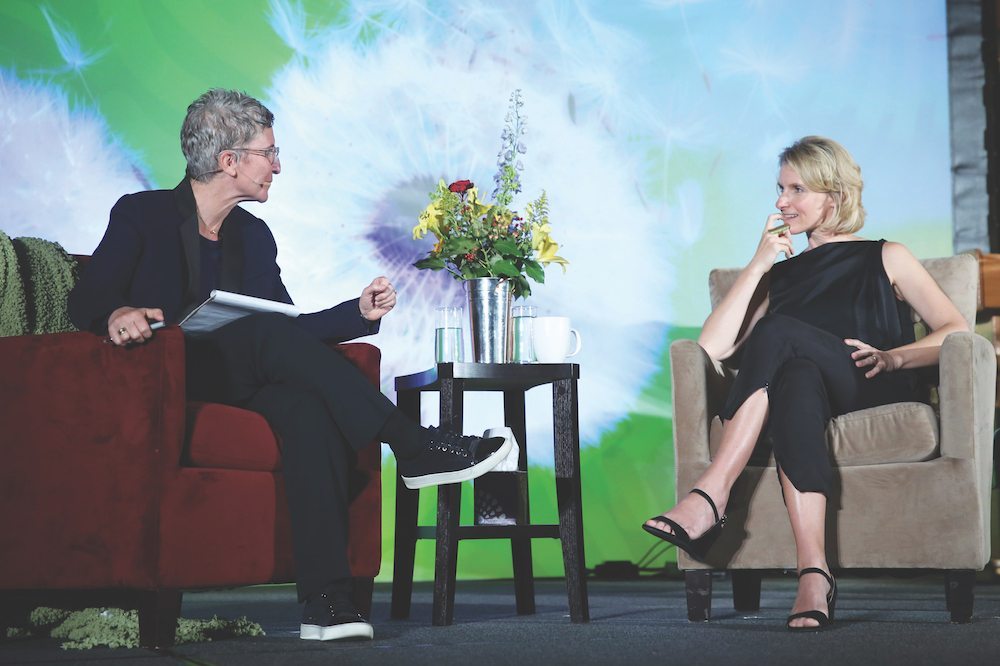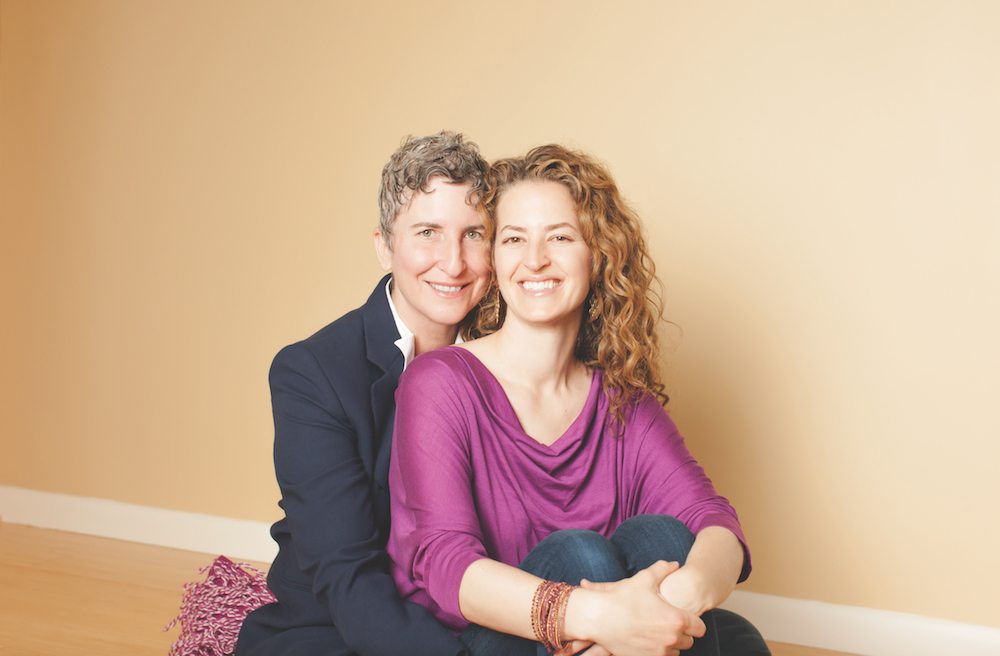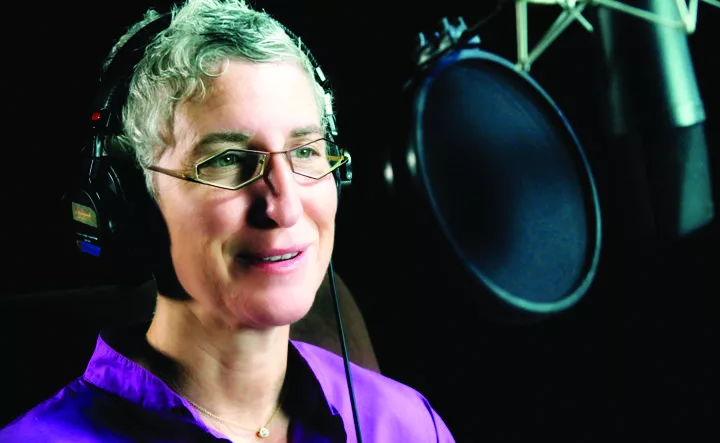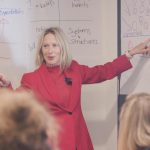Tami Simon was a mission-driven entrepreneur before the term even existed. In 1985, at age 22, she launched her multimedia publishing company, Sounds True, to share audio recordings about the world’s wisdom traditions. More than 30 years later, the operation she started with just a cassette dubber in her house now reaches 5 million people every year. Its offerings include books, music, courses, DVDs, and more from some of the best-known names in wisdom and spirituality, including Thich Nhat Hanh, Elizabeth Gilbert, and Eckhart Tolle.
Conscious Company co-founder Meghan French Dunbar recently sat down with Simon at Sounds True’s Colorado headquarters to learn more about her journey as an entrepreneur and her secrets to running a successful conscious business.
Sounds True At A Glance
• Location: Boulder, CO
• Founded: 1985
• Employees: 120
• Structure: For-profit
• Conscious practice highlights: the newly formed Sounds True Foundation distributes programs to people who would otherwise not have access; the business is 100% wind-powered; the company offers employees a 2:1 match for donations to nonprofits, plus a half day paid per month for volunteering, paid time off for carpooling, and considers birthdays a paid holiday.
• Mission statement: “To inspire, support, and serve personal transformation and spiritual awakening.”
The Interview
What was your inspiration behind founding the company? Where did you find the confidence to believe you could do something like this at such a young age?
Tami Simon: I don’t think I had some great amount of confidence. I saw it as an experiment. I had a small inheritance upon my father’s death, about $50,000. I thought to myself, “I’m basically unemployable right now. This money came to me as a gift. I feel comfortable risking it for an experiment that I’m turned on by. And if it doesn’t work out, then I’ll be out there looking for a job just like I’d be now.” So it wasn’t really confidence. It was more of a measured experiment.
Now, the inspiration behind Sounds True came from a place of desperation and angst. I had quite a lot of existential despair after having dropped out of college. I still cared deeply about learning and wanted to learn more than anything, but I had a deep heart passion and saw that that wouldn’t be realized within an academic setting, because what I was interested in learning about was the spiritual journey through direct experience. You have to know it in your bones, in your body. You can’t analyze what other people’s discoveries are. So I couldn’t follow an academic path. At the time, even writing from a subjective voice wasn’t particularly welcome in academia. So I left Swarthmore College and I traveled around India and Sri Lanka and Nepal and I discovered the practice of meditation.
When I started meditating I felt like I had found a gateway, I’d found a method, and it was what I needed. I made a commitment at that point to introduce as many people as possible to the practice of meditation, and more widely, to any method that helped people tune in to their own inner knowing and the process of — you could call it “direct revelation,” or direct contact with a sense of aliveness and purpose and inspiration.
I decided, “This is what I’m going to do. I’m going to turn people on, and there are so many different methods that have been taught throughout the great wisdom traditions; they’re all there, they just need to be made readily accessible.” So I came back to the United States after my travels, my father died and I received this relatively small inheritance, and I didn’t quite know how to go about it. But I talked to a very successful entrepreneur in Colorado, someone I was interviewing for a volunteer radio show I was hosting at a Boulder public radio station. I said, “I’ve received this small amount of money; I’m not quite sure what to do with it.” And he said, “Why don’t you put that money into yourself?” I said, “That’s a great idea, but I don’t know how to do that. I don’t know what I would do.” And he said, “Why don’t you reflect on it and come back in a few days and we’ll talk.”
When I left his office, I had a strange experience: I felt like I was walking slightly off the ground. It was like, “Oh, my God. I’m not exactly in my body. I’m walking on air. This is so weird.” I’m telling you this because it happened. There have been media outlets, believe it or not, that have made fun of me; “Tami shares her out-of-body experience where she hears a voice.” Because I did hear a voice. And the voice said, “Disseminate spiritual wisdom.”
It was more real than real. Nobody could take it away. I knew it wasn’t some idea that my mind had fabricated of what I should do in the world because someone would approve of it. In my own inner experience, it was like, “Yes, I will do this. It’s been given to me as my operating instructions. It’s known.”
At the time, I was reading a book by Eugene Gendlin on focusing, and this book has you tune into the sensations of your body. It’s called the “felt sense.” And once you know the felt sense in any situation, it gives you an operating compass for inner investigation. I knew I was having a strong felt sense of the rightness of disseminating spiritual wisdom.
My feet hit the ground again and I kept walking and I started thinking about it: “How am I going to disseminate spiritual wisdom?” I already had a radio show, my volunteer interview program. I also had discovered at college that I liked listening to lectures more than I liked reading. I loved going and hearing a great talk.
I compared disseminating spiritual wisdom through audio, which was something that seemed natural to me, to books, which was already an established industry, or doing it through video. I hated television at the time. My parents watched a lot of television and I thought that it dumbed down a lot of the conversation. I thought, “I’ll start by disseminating spiritual wisdom with audio. That’s a good medium for me. I love listening. I love the radio. I already have a radio show.”
It was a program where I was interviewing spiritual teachers because I wanted to continue my own learning that had been interrupted through leaving academia. People wanted copies of my radio show. So I already had a very small cottage business where I made copies of my interview show on a cassette-dubbing player and sold them for $10 each. Maybe I’d sell three copies in a week, maybe I’d sell ten copies in a really good week. I thought, “Sounds True will be the outgrowth of this radio show and cassette duplication and that’s how I’ll disseminate spiritual wisdom.”
The first podcast! That’s fantastic. The night we had the idea for Conscious Company Magazine was the same night I got fired from my job and I woke up the next morning and I had a similar experience. It was a wisdom that was handed to me, and I looked at my partner and I said, “The universe just told me that I’m supposed to do this. I have to do it and I know how to do it and I know exactly what I’m going to do.” It was like something felt downloaded to me. I saw it all within a minute.
TS: I don’t know what state of mind you were in in the months leading up to waking up to that download, but for me, as I mentioned, I had had a lot of despair. The despair I had was that I’d been given so many opportunities in my life for a fantastic education, to travel to different places in the world, and I didn’t know how I was going to give back. I felt this burden of, “You’ve been given so much, how are you going to give? How are you going to contribute? How are you going to serve, Tami? You’ve got to do something.”
And I had a prayer: “God, I’m willing to do your work. Please show me what it is.” And I said that prayer over and over again. I had been immersed in that field of repeating that prayer over and over. It was also a sense that I was being given an answer to something that I had been asking for, as a cry.
I want to go back to this concept of starting something new as an experiment. One of the traps a lot of us fall into when we think about starting our own venture is the weight of it and the fear of failure. But it sounds to me as though you removed the fear of failure by looking at it with a bit of levity, more as, “I just want to see if I can do this.” Does that feel true?
TS: Quite honestly, at that age and at that time in my life, I felt I had nothing to lose. I was a college dropout. I didn’t know what to do. Do you know what I mean? That’s different than somebody who has several kids and a mortgage.
Also, I was fortunate in that it was an inheritance, and I know everybody doesn’t have that. I recognized that, and the privileged situation I was in. It’s not like I went to a bank and borrowed money that I would have to pay back. I was lucky.
Do you feel as though it’s wiser for people to start ventures at a younger age because they have less to lose?
TS: No. But I think it’s smart to come up with a situation where you’ve mitigated your risk in a certain way. So maybe there’s some bridge from what you’re currently doing, and you do your new venture ten hours a week while you still have a job. Then you don’t have to feel like, “Oh, my God, I’m risking everything to do this.”
I think there are lots of ways you can start a new venture where you feel like, “This is the level of risk I can handle and stay grounded and open and have an adventurous spirit about it. I’m not going to go into some long-term debt that I’ll never be able to get out of.” I would never want to put that kind of pressure on myself. There are many creative ways, no matter the stage of life, to test your ideas slowly and gradually and be in a relative comfort zone while you do it, not “bet the farm,” if you will.
Part of that is because I don’t want to be in a fear state. I don’t want to approach my day that way. I want to approach my day with more of a sense of dialoguing with life. So I’m putting out, “Hey, what about this?” And life says, “Terrible idea, Tami. Don’t do it.” Okay. Or life says, “It’s a cool idea. Wow. You’re off to a great start. Let’s do more of that. Oh, look who you just met. That person can really help you.”
For me, it was having this dialogue with life and seeing what doors open, and when the doors shut, not going there. Being able to be more like a bloodhound who’s smelling the next part of the trail, having all my senses intact, and not having my senses offline because I’m in a fear state. I’m using the word “smelling” as a metaphor because it’s so instinctive, so close to the body, so close to what we know before we overanalyze. You just “smell” it.

Sounds True publishes books, courses, and lectures from a variety of well-known spiritual teachers.
I’m curious about the journey you’ve been on since selling the cassette tapes. What has accounted for your ability to scale and grow? Has it really been following the senses?
TS: Someone who works with me recently said, “What’s different about you, Tami, is that you’ve hired a bunch of people who are smarter than you.” I think he meant it as a compliment.
I go for the magic. By magic, I mean there’s a spark. There’s life. There’s excitement. And for me, a lot of the magic happens between people. It’s interpersonal. I’m always looking for the magic in a new situation or opportunity. That feeling like, “God, I want to do that with this person. I want to try it with this person. Just in talking, we came up with three new possibilities that I wouldn’t have thought of.” It’s also about how I feel. There’s this sense of expansion and possibility. It’s almost like the future is starting to be dreamed, and you can see the dream pathway forward while you’re with the person.
So I ask, “Where’s the magic?” And when I find people and I have that interaction with them, I want to work with them. My heart is also way open at that point so I can share that, and when you share that, people also love that. “I want to work with you, too. We’re falling in love.”
It’s hard to use that language because if you use that language people are like, “What are you talking about? The HR department is going to come in and shut you down.” But we don’t have enough vocabulary; it’s a certain kind of love and it’s the love of co-creative, mission-based people who are here to do something together.
In Judaism, they have this idea that people actually incarnate in tribes to accomplish certain missions. A lot of what has happened over 32 years of running Sounds True is that I’ve found people who are so gifted in so many ways that I’m not, but what I can do is identify them and then I can love them and I can give them a bunch of autonomy and creativity and an opportunity for them to actualize themselves working with me. It’s not all Tami’s dream and Tami’s vision. No. Just like in any partnership, both people have to feel actualized.
I’m curious about your highest personal values and how you live those on a day-to-day basis.
TS: I value truth-telling. The company is called Sounds True. It’s called Sounds True for a reason. When I was young, I couldn’t stand it when there were either adults in the room or people broadcasting on television, politicians, and I could tell they weren’t telling the truth. It just upset me. When I feel the truth is being spoken, I can relax, and I also feel inner coherence inside of me. When things are being spoken that aren’t true, things feel jagged to me. Then I have to figure out what’s really going on with this person. They’re saying x, y, z, but they mean something different. They’re telling me everything’s great and I can tell that inside they either want to scream or cry or something. I feel crazy. What’s actually going on in the room? I don’t like that.
I like to tell the truth. People at will say, “Look, the one thing you know from Tami is she’ll shoot straight.” And that’s true. I will and I do. That’s because it puts me into my own integrity, and when I’m in my own integrity, I feel light and aligned and connected to a sense of purpose and connected to a field of support.
And if I’m not in my own integrity I actually can’t live my life. I can’t do anything. I’m not willing to do that. It’s not an option for me as a person. To me, being in that kind of integrity creates a certain kind of grace field. That’s language from Caroline Myss, and I think that’s true.

Simon interviewing author Elizabeth Gilbert.
I’m also curious about the values of Sounds True, and if you have codified values that you live by.
TS: Yeah. From the very beginning part of what I articulated — and this was before the whole notion of multiple bottom lines became popular — was the idea that we were doing three things at Sounds True.
We were fulfilling our mission to disseminate spiritual wisdom. We were doing it in a certain kind of way, the how of the business — we’ve come to call that “the relationship bottom line.” Sometimes I’ve called it “the love bottom line.” And then the third is that we need to be profitable and generate cash so that we can do these first two things. Otherwise we can’t do it. But it’s not in and of itself some goal. It’s so we can do number one and number two. We can expand our mission and hire more people, etc.
The how is what gets really interesting. This relationship bottom line. This is where I have a lot of excitement as a person, because I think the workplace actually demands that we learn how to collaborate and honor each other. That’s huge. If human beings could do that across the board in their lives, we would have a completely different world. If human beings knew how to really listen to each other, how to work on their own shadow material and their areas that are not as developed, that are getting in the way of productive teamwork….
The workplace provides us with this incredible opportunity to actually up-level humanity and to teach relational skills. I know what’s popular right now is bringing mindfulness into the workplace. Obviously that’s incredibly valuable. It’s the first step, that we’re able to quiet our busy minds enough, find pauses, take breaks, tune into our bodies, and find a place of open relaxation and being.
But then you go into a meeting. What’s your orientation in the meeting? Are you open to receiving difficult feedback from other people? Are you open to taking another person’s point of view even if you disagree with it? Can you slow down and take their perspective? Is there a way to make room for everybody in the meeting to be heard and included in the discussion? Are leaders focused on that? What’s this new kind of we, you could say, or new kind of collective heart-mind that can be cultivated at work? That’s what’s interesting, because it’s a huge social action agenda.
Because as you cultivate that at work, you can’t help but bring it into your home life. People have different kinds of marriages. Marriages among equals who work out their problems and understand each other and who are committed to love and a certain kind of harmony and protection of each other — how does that transform families and the kind of worlds children come into? Then how does that transform every group and how groups relate to other groups? It’s the same principles.
That’s what we’re trying to bring into Sounds True: that how, which is a level of relational intelligence at work. It comes from how we give each other feedback and how we’re willing to learn from the feedback, and creating a workplace culture that’s committed to personal development. That’s what we’re doing here. What’s our personal growth goal? How does it change? How are we meeting it in any given period? How do we talk about it? Everybody is on a personal growth path because everybody could grow more.
How do you facilitate that in the workplace? Is everyone trained in a certain way? Is it operating principles that everyone abides by? How do you consistently reinforce those practices?
TS: It’s a continual evolution. We’ve tried a bunch of things. We’re trying new things. We have a coach who works with the leadership team and trains managers. Currently, just as an example, we’ve been working with a book I found. It’s called “The Ideal Team Player” by Patrick Lencioni and it talks about three values: humility (versus arrogance), hunger (versus laziness), and relational smarts.
Everybody on our leadership team took a questionnaire and rated themselves in terms of where they were weak and where they were strong. We shared that information with each other. In the areas where we were weak, we went around and said, “Can you help me see what I can’t see about myself?” People got some pretty sizzling feedback about that. And then the response was, “Okay, I get it. I’m not committed to grow in this area.”
Facilitating growth involves a certain onboarding process and it’s a continual evolution in training and bringing in new materials and talking about it. But the main thing is saying that how we conduct ourselves at the business needs to be consonant with the products we’re putting out, which are the world’s wisdom teachings. And we’re not going to trespass any of the classic virtues that all the wisdom traditions uphold. How we conduct ourselves as an organization will be coherent with those virtues.
We’re always figuring out how to do that, and it’s very alive. I know you’re asking, “Is it a set of take this or take that?” What I’ve found is, whenever something like that becomes laminated and put into place, it becomes dead in a certain kind of way; it becomes this thing people refer to. Here, it’s much more living, and ever-changing, and in dialogue; “What’s working now?” “Let’s bring in this new set of reflections now.” It keeps changing. That’s what keeps it engaging for people.
What is your definition of conscious leadership? What do you think are the best practices to help facilitate and embody conscious leadership in the workplace?
TS: I know that “conscious” is in the name of your magazine so I’ll tread carefully here. However, the word “conscious” always gives me pause, because I believe that most of what’s driving most humans is their unconscious. We know that 95 percent of the behavior in our life comes from unconscious material, not conscious, and we’re not actually very conscious as human beings, ever.
To me, part of being a conscious leader is being willing, by receiving feedback from the people around me, to reflect and see how I’m being unconscious. Then I become more conscious because I start seeing myself the way they see me.
What’s the best way to be a conscious leader, what are the core principles? Having a relentless and lit-up interest in personal growth is critical. Every kind of personal growth. What are your relationships like everywhere? Your relationships with your biographical family? With your partner and your children? Your ancestry? That’s informing your unconscious, your actual DNA. Have you done deep ancestral healing work? Are you willing to do real personal growth with the people you work with and hear what they have to say? I’m repeating that point, but I think it’s so powerful.
Then, how’s your health? Are you working yourself to the point where you’re no longer a healthy and vital person? That’s an area of personal growth. How’s your sleep? How’s your sense of self-compassion? Are you gentle towards yourself? Kind? Do you treat yourself the way you would treat a dear friend? What about when things go wrong? Can you be kind to yourself then?
It goes on and on and on, but the more we work on all these aspects of who we are, the more that becomes our gift as a leader. That’s our presence. That’s what people are really picking up on, regardless of what we say and what kind of core principles we roll out as our new program.
What people really are picking up on is who we are, what our level of awareness is; and, I would say, our level of freedom as a person, because that’s what really turns people on. “Oh, my God, that person is so free. Free to create. Free to be themselves. They’re so comfortable in their own skin. I want to be comfortable in my own skin like that. I want to be able to create like that, to tell the truth like that, to inspire others like that. I want to be able to admit all the areas that are hard for me like that.” That’s what turns people on.
Going back to the first component of that is this consistent request for feedback from those in your life. I heard you talk about the people in your workspace. I’m curious about how you seek feedback from those outside of the workspace. Do you work with a coach? Does your partner provide that for you?
TS: I’m a feedback junkie, so I have a coach. I have a therapist. I have a Diamond Approach inquiry teacher. I have an energy healer, and I have a wife who is an unstoppable goddess.
That’s our bell — we have a 15-minute mindfulness practice that sounds through at noon.
As I was saying, my wife is fierce about her own needs and creating a life together that’s beautiful and loving.

Simon and her wife, Julie Kramer. Photo by Andrew Young
I’m curious about practices for work–life integration. I don’t even like the word “balance” anymore, of pretending that work and life are two separate entities. But do you feel like you’ve found an integration that helps you be the conscious leader you would like to be, and that helps you be able to fulfill your love for every aspect of your life outside of the workplace?
TS: Yeah. It’s not been simple. It’s been forged the way, maybe, a piece of sculpture is forged in a fire over a long period of time. But over time, I’ve learned a lot more how to let go and let other people at Sounds True do things that don’t have my fingerprints on them.
That was the hardest part, because I wanted to have my fingerprints everywhere. If I was involved, I could maybe make it a little bit better, or at least it would be more the way I wanted it. And I had to let go of that for the company to grow. I just had to say “I’m going to do what I can on the projects I can, and I’m going to trust a bunch of other people to do other things.
What are your top pieces of advice for social entrepreneurs or mission-driven business leaders?
TS: You have to love the work you’re doing, and — this is a strong statement — know you would do it even if you weren’t getting paid. Because, at least in my experience, I did so much work at Sounds True, interviewing people, producing audio programs, editing the programs, going to events and retreats — but that’s what I wanted to do. That was my learning. I wasn’t demanding that the business pay me for every hour of my time, because I wanted to do it anyway. There has to be a great love of the actual work you’re doing because you’re going to end up doing it for thousands and thousands of hours. And it won’t be fulfilling if it’s not something you just actually love to do.
The second thing is, of course: finding the right business model is critical. Because even if you love it, if you don’t have the right model, you won’t be successful. To have the right model, you need to be able to think strategically and understand pricing and some other things. You can learn from people even if you don’t know that. But don’t settle in with a bad business model. Keep experimenting and trying until you get a model that works and fits with your passion.
Is there anything that I didn’t ask you about that you wish I would have?
TS: One thing that occurs to me is that I think often people make this strange false distinction between what will make their business successful and how they can achieve their financial goals and what their spiritual values are and how they need to have balance in their life . Then there’s this idea that now I need to integrate these two things that are separate.
The way I think, the core of who you are as a human being wants to both achieve a level of business and financial success, and do so according to a strong inherent human value system. They’re already wedded together. It’s only our culture that separated them. “I want to contribute, I want to do it in a way that’s loving, and I want to be successful at it.” They’re not separate to begin with, so let’s not try to “reintegrate” them. Let’s find the place in us where it’s one movement of contribution, success, service, and human values.
What is giving you hope for the future?
TS: Quite honestly, sitting here with you gives me hope for the future. I meet a lot of loving and sincere people who are what I would call “young leaders.” I see in a lot of them a natural openness. I’ve done thousands of hours of meditation; maybe they won’t need quite as much formal practice. Maybe there’s a certain field that’s been opened, just like how the feminist movement . I know this may not be true for other women, but being a woman in business when I came of age, I didn’t feel like there were that many obstacles for me; women before me paved the way. And I’m continuing that for other generations.
Now, when it comes to the path of spiritual discovery and matching that spiritual intensity with entrepreneurship, that path is also being paved. New people are coming in and they can take advantage of the work that has been done by previous generations and they can start with a higher spiritual IQ and just get to work. That gives me hope.





